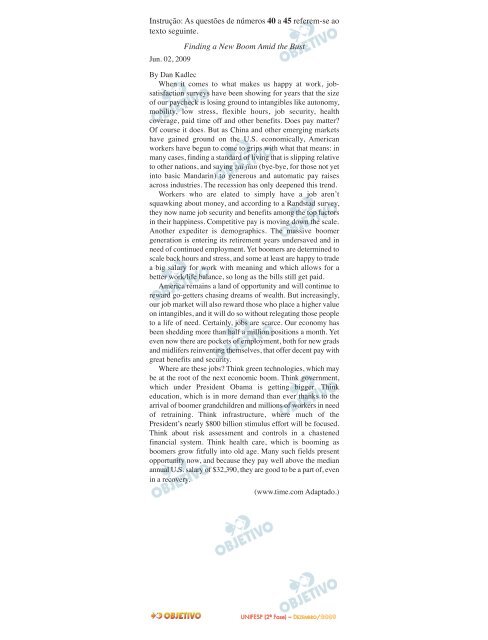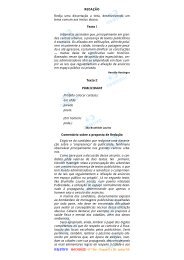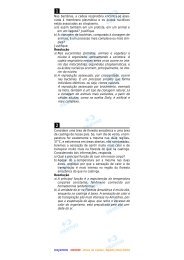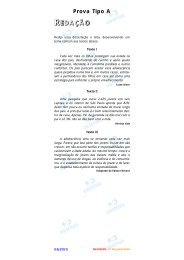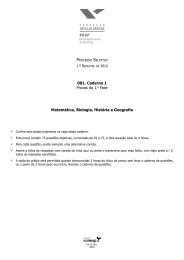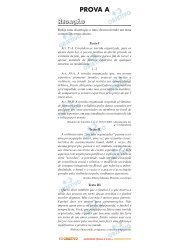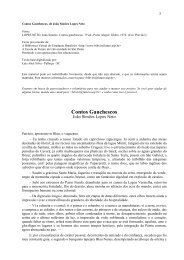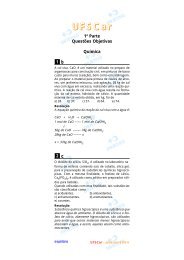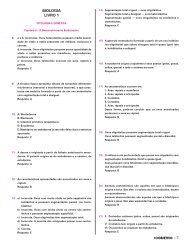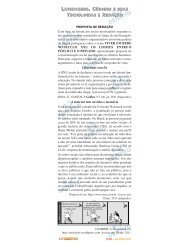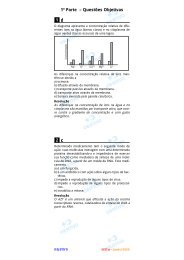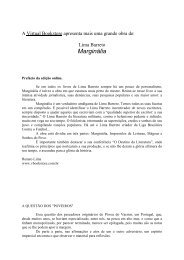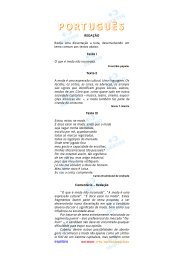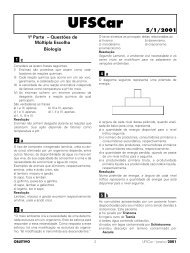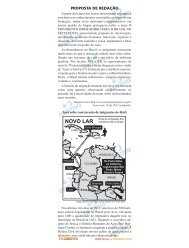You also want an ePaper? Increase the reach of your titles
YUMPU automatically turns print PDFs into web optimized ePapers that Google loves.
Instrução: As questões de números 40 a 45 referem-se ao<br />
texto seguinte.<br />
Finding a New Boom Amid the Bust<br />
Jun. 02, 2009<br />
By Dan Kadlec<br />
When it comes to what makes us happy at work, jobsatisfaction<br />
surveys have been showing for years that the size<br />
of our paycheck is losing ground to intangibles like autonomy,<br />
mobility, low stress, flexible hours, job security, health<br />
coverage, paid time off and other benefits. Does pay matter?<br />
Of course it does. But as China and other emerging markets<br />
have gained ground on the U.S. economically, American<br />
workers have begun to come to grips with what that means: in<br />
many cases, finding a standard of living that is slipping relative<br />
to other nations, and saying zai jian (bye-bye, for those not yet<br />
into basic Mandarin) to generous and automatic pay raises<br />
across industries. The recession has only deepened this trend.<br />
Workers who are elated to simply have a job aren’t<br />
squawking about money, and according to a Randstad survey,<br />
they now name job security and benefits among the top factors<br />
in their happiness. Competitive pay is moving down the scale.<br />
Another expediter is demographics. The massive boomer<br />
generation is entering its retirement years undersaved and in<br />
need of continued employment. Yet boomers are determined to<br />
scale back hours and stress, and some at least are happy to trade<br />
a big salary for work with meaning and which allows for a<br />
better work/life balance, so long as the bills still get paid.<br />
America remains a land of opportunity and will continue to<br />
reward go-getters chasing dreams of wealth. But increasingly,<br />
our job market will also reward those who place a higher value<br />
on intangibles, and it will do so without relegating those people<br />
to a life of need. Certainly, jobs are scarce. Our economy has<br />
been shedding more than half a million positions a month. Yet<br />
even now there are pockets of employment, both for new grads<br />
and midlifers reinventing themselves, that offer decent pay with<br />
great benefits and security.<br />
Where are these jobs? Think green technologies, which may<br />
be at the root of the next economic boom. Think government,<br />
which under President Obama is getting bigger. Think<br />
education, which is in more demand than ever thanks to the<br />
arrival of boomer grandchildren and millions of workers in need<br />
of retraining. Think infrastructure, where much of the<br />
President’s nearly $800 billion stimulus effort will be focused.<br />
Think about risk assessment and controls in a chastened<br />
financial system. Think health care, which is booming as<br />
boomers grow fitfully into old age. Many such fields present<br />
opportunity now, and because they pay well above the median<br />
annual U.S. salary of $32,390, they are good to be a part of, even<br />
in a recovery.<br />
(www.time.com Adaptado.)<br />
<strong>UNIFESP</strong> (2ª Fase) <strong>–</strong> DEZEMBRO/2009


